van Charles Higham, over hoe multinationals uit de geallieerde landen Hitler Duitsland financierden, over hoe Hitler Duitsland financieel afhankelijk was van deze geallieerde multinationals, begint met een hoofdstuk over de bij vrijwel iedereen onbekende Bank der banken, De (Rothschild) Bank for International Settlements in Basel. In de officiële media als NRC, de Volkskrant of De Telegraaf kom je -niet verwonderlijk- zelden of nooit iets tegen over deze centrale bank van de centrale banken.
TRADING WITH THE ENEMY: AN EXPOSE OF THE NAZI-AMERICAN MONEY PLOT 1933-1949
Chapter 1: A Bank for All Reasons
On a bright May morning in 1944, while young Americans were dying on the Italian beachheads, Thomas Harrington McKittrick, American president of the Nazi-controlled Bank for International Settlements in Basle, Switzerland, arrived at his office to preside over a fourth annual meeting in time of war. This polished American gentleman sat down with his German, Japanese, Italian, British, and American executive staff to discuss such important matters as the $378 million in gold that had been sent to the Bank by the Nazi government after Pearl Harbor for use by its leaders after the war. Gold that had been looted from the national banks of Austria, Holland, Belgium, and Czechoslovakia, or melted down from the Reichsbank holdings of the teeth fillings, spectacle frames, cigarette cases and lighters, and wedding rings of the murdered Jews.
The Bank for International Settlements was a joint creation in 1930 of the world's central banks, including the Federal Reserve Bank of New York. Its existence was inspired by Hjalmar Horace Greeley Schacht, Nazi Minister of Economics and president of the Reichsbank, part of whose early upbringing was in Brooklyn, and who had powerful Wall Street connections. He was seconded by the all-important banker Emil Puhl, who continued under the regime of Schacht's successor, Dr. Walther Funk.
Sensing Adolf Hitler's lust for war and conquest, Schacht, even before Hitler rose to power in the Reichstag, pushed for an institution that would retain channels of communication and collusion between the world's financial leaders even in the event of an international conflict. It was written into the Bank's charter, concurred in by the respective governments, that the BIS should be immune from seizure, closure, or censure, whether or not its owners were at war. These owners included the Morgan-affiliated First National Bank of New York (among whose directors were Harold S. Vanderbilt and Wendell Willkie), the Bank of England, the Reichsbank, the Bank of Italy, the Bank of France, and other central banks. Established under the Morgan banker Owen D. Young's so-called Young Plan, the BIS's ostensible purpose was to provide the Allies with reparations to be paid by Germany for World War I. The Bank soon turned out to be the instrument of an opposite function. It was to be a money funnel for American and British funds to flow into Hitler's coffers and to help Hitler build up his war machine.
The BIS was completely under Hitler's control by the outbreak of World War II. Among the directors under Thomas H. McKittrick were Hermann Schmitz, head of the colossal Nazi industrial trust I.G. Farben, Baron Kurt von Schroder, head of the J. H. Stein Bank of Cologne and a leading officer and financier of the Gestapo; Dr. Walther Funk of the Reichsbank, and, of course, Emil Puhl. These last two figures were Hitler's personal appointees to the board.
The BIS's first president was the smooth old Rockefeller banker, Gates W. McGarrah, formerly of the Chase National Bank and the Federal Reserve Bank, who retired in 1933. His successor was the forty-three-year-old Leon Fraser, a colorful former newspaper reporter on the muckraking New York World, a street-corner soapbox orator, straw-hat company director, and performer in drag in stage comedies. Fraser had little or no background in finance or economics, but he had numerous contacts in high business circles and a passionate dedication to the world of money that acknowledged no loyalties or frontiers. In the first two years of Hitler's assumption of power, Fraser was influential in financing the Nazis through the BIS. When he took over the position of president of the First National Bank at its Manhattan headquarters in 1935, he continued to exercise a subtle influence over the BIS's activities that continued until the 1940s.
Other directors of the Bank added to the powerful financial group. Vincenzo Azzolini was the accomplished governor of the Bank of Italy. Yves Breart de Boisanger was the ruthlessly ambitious governor of the Bank of France; Alexandre Galopin of the Belgian banking fraternity was to be murdered in 1944 by the Underground as a Nazi collaborator.
The BIS became a bete noire of U.S. Secretary of the Treasury Henry Morgenthau, a deliberate, thorough, slow-speaking Jewish farmer who, despite his origins of wealth, mistrusted big money and power. A model of integrity obsessed with work, Morgenthau considered it his duty to expose corruption wherever he found it. Tall and a trifle ungainly, with a balding high-domed head, a high-pitched, intense voice, small, probing eyes, pince-nez, and a nervous, hesitant smile, Morgenthau was the son of Woodrow Wilson's ambassador to Turkey in World War I. He learned early in life that the land was his answer to the quest for a decent life in a corrupt society. He became obsessed with farming and, at the age of twenty-two, in 1913, borrowed money from his father to buy a thousand acres at East Fishkill, Dutchess County, New York, in the Hudson Valley, where he became Franklin D. Roosevelt's neighbor. During World War I he and Roosevelt formed an intimate friendship. Elinor Morgenthau became very close to her near namesake, Eleanor Roosevelt. While Roosevelt soared in the political stratosphere, Morgenthau remained rooted in his property. In the early 1920s he published a newspaper called The American Agriculturist that pushed for government credits for farmers. When Roosevelt became governor of New York in 1928, he appointed Morgenthau chairman of the Agricultural Advisory Commission. Morgenthau showed great flair and a passionate commitment to the cause of the sharecropper.
Legend has it that on a freezing winter day in 1933, FDR and Morgenthau met and talked on the borderline of their two farms. Morgenthau is supposed to have said to Roosevelt, "Life is getting slow around here." And FDR replied, "Henry, how would you like to be Secretary of the Treasury?"
What he lacked in knowledge of economics, Morgenthau rapidly made up in his Jeffersonian principles and role as keeper of the public conscience. Close to a thousand volumes of his official diaries in the Roosevelt Memorial Library at Hyde Park give a vivid portrait of his inspired conducting of his high office. He was aided by an able staff, which he ran with benign but military precision. His most trusted aide was his Assistant Secretary, Harry Dexter White. Unlike Morgenthau, White came from humble origins. Jewish also, he was the child of penniless Russian immigrant parents who were consumed with a hatred of the czarist regime. White's early life was a struggle: this short, energetic, keen-faced man fought to help his father's hardware business succeed, finally forging a career as an economist with the aid of a Harvard scholarship and a professorship at Lawrence College, Wisconsin. He was opinionated and self-confident to a degree. Although he was frequently accused of being a communist sympathizer, he was in fact simply an old-fashioned liberal driven by his ancestral memories of Russian imperialism.
It is unfortunate that Morgenthau did not appoint White as his representative at BIS meetings, but White was too valuable in Washington. Instead, Morgenthau sent the more questionable Merle Cochran to investigate the BIS. Cochran was on loan to Treasury from the State Department; he represented the State Department's sophisticated neutralism before (and during) the war. Cochran became Secretary of the American Embassy in Paris, working directly under Roosevelt's friend the duplicitous, Talleyrand-like Ambassador William Bullitt. Cochran spent most of his time in Basle conveying to both Morgenthau and Cordell Hull details of what the BIS was up to. Very much opposed to White -- indeed, violently so -- Cochran was sympathetic with the BIS and to the Nazis, as his various memoranda made clear. Morgenthau took Cochran's political judgments with a degree of skepticism, but continued to use him over White's objections because he knew the Germans would trust Cochran and confide much in him. Day after day, Cochran lunched with Schmitz, Schroder, Funk, Emil Puhl, and the other Germans on the BIS board, obtaining a clear picture of the BIS's plans for the future.
In March 1938, when the Nazis marched into Vienna, much of the gold of Austria was looted and packed into vaults controlled by the Bank for International Settlements. The Nazi board members forbade any discussion of the transaction at the BIS summit meetings in Basle. Cochran, in his memoranda to Morgenthau, failed to score this outrageous act of theft. The gold flowed into the Reichsbank under Funk, in the special charge of Reichsbank vice-president and BIS director, Emil Puhl. On March 14, 1939, Cochran wrote to Morgenthau "I have known Puhl for several years, and he is a veteran and efficient officer." He also praised Walther Funk.
His timing was not good. One day later, Hitler followed his forces into Prague. The storm troops arrested the directors of the Czech National Bank and held them at gunpoint, demanding that they yield up the $48 million gold reserve that represented the national treasure of that beleaguered country. The Czech directors nervously announced that they had already shifted the gold to the BIS with instructions that it be forwarded to the Bank of England. This was an act of great naivete. Montagu Norman, the eccentric, Vandyke-bearded governor of the Bank of England, who liked to travel the world disguised as Professor Skinner in a black opera cloak, was a rabid supporter of Hitler.
On orders from their German captors, the Czech directors asked the Dutch BIS president, J.W. Beyen, to return the gold to Basle. Beyen held an anxious discussion with BIS general manager Roger Auboin of the Bank of France. The result was that Beyen called London and instructed Norman to return the gold. Norman instantly obliged. The gold flowed into Berlin for use in buying essential strategic materials toward a future war.
There the matter might have been buried had it not been for a young, very bright, and idealistic London journalist and economist named Paul Einzig, who had been tipped off to the transaction by a contact at the Bank of England. He published the story in the Financial News. The story caused a sensation in London. Einzig held a hasty meeting with maverick Labour Member of Parliament George Strauss. Strauss through Einzig began investigating the matter.
Henry Morgenthau telephoned Sir John Simon, British Chancellor of the Exchequer, on a Sunday night in an effort to determine what was going on. Merle Cochran had telegraphed him with a characteristic whitewash of the BIS and an outright dismissal of Einzig's charges that the BIS was a Nazi outfit. Sir John said icily on the transatlantic wire, "I'm in the country, Mr. Secretary. We are enjoying our dinner. It is not our custom to do business by telephone."
"Well, Sir John," Morgenthau replied, "we've been doing business by telephone over here for almost forty years!"
Sir John Simon continued to dodge Morgenthau's questions. On May 15, George Strauss asked Prime Minister Neville Chamberlain, "Is it true, sir, that the national treasure of Czechoslovakia is being given to Germany?" "It is not," the Prime Minister replied. Chamberlain was a major shareholder in Imperial Chemical Industries, partner of I.G. Farben whose Hermann Schmitz was on the board of the BIS. Chamberlain's reply threw the Commons into an uproar. Einzig refused to let go. He was convinced that Norman had transferred the money illegally in collusion with Sir John Simon. Simon, in answer to a question from Strauss, denied any knowledge of the matter.
Next day, Einzig tackled Sir Henry Strakosch, a prominent political figure. Strakosch refused to disclose the details of the conversa-tion he had had with Simon. But Strakosch finally cracked and admitted that Simon had discussed the transfer of the Czech gold.
Einzig was jubilant. He called Strauss with the news. Strauss put a further question to Sir John Simon in a debate on May 26. Once again, Simon hedged. Winston Churchill was the leader of a violent onslaught on the unfortunate Chancellor of the Exchequer.
Morgenthau demanded to know more. Cochran's letter from Basle dated May 9 and received May 17 brushed over the issue once more. Cochran wrote,
There is an entirely cordial atmosphere at Basle: most of the central bankers have known each other for many years, and these reunions are enjoyable as well as profitable to them. I have had talks with all of them. The wish was expressed by some of them that their respective statesmen might quit hurling invectives at each other, get together on a fishing trip with President Roosevelt or to the World's Fair, overcome their various prides and complexes, and enter into a mood that would make comparatively simple the solution of many of the present political problems.
This picture of good cheer scarcely convinced Morgenthau. On May 31, Associated Press reported from Switzerland that transactions were completed between the BIS and the Bank of England and the Czech gold was now firmly in Berlin.
During World War II, Einzig, who had never forgotten the Czech gold affair, ran into J. W. Beyen in London and asked him if he would now admit what had taken place. Beyen said smoothly, "It is all technical. The gold never left London." Einzig was amazed. He wrote an apology to Beyen in his book of memoirs, In the Center of Things.
The truth was that the gold had not had to leave London in order to be available in Berlin. The arrangement between the BIS and its member banks was that transactions were not normally made by shipping money -- dangerous and difficult when the shipments would show up in customs manifests -- but simply by adjusting the gold deposit accounts. Thus, all Montagu Norman had to do was to authorize Beyen to deduct $40 million from the Bank of England's holdings in Basle and replace the same amount from the Czech National Bank holdings in London.
By 1939, the BIS had invested millions in Germany, while Kurt von Schroder and Emil Puhl deposited large sums in looted gold in the Bank. The BIS was an instrument of Hitler, but its continuing existence was approved by Great Britain even after that country went to war with Germany, and the British director Sir Otto Niemeyer, and chairman Montagu Norman, remained in office throughout the war.
In the middle of the Czech gold controversy, Thomas Harrington McKittrick was appointed president of the Bank, with Emil Meyer of the Swiss National Bank as chairman. White-haired, pink-cheeked, smooth and soft-spoken, McKittrick was a perfect front man for The Fraternity, an associate of the Morgans and an able member of the Wall Street establishment. Born in St. Louis, he went to Harvard, where he edited the Crimson, graduating as bachelor of arts in 1911. He worked his way up to become chairman of the British-American Chamber of Commerce, which numbered among its members several Nazi sympathizers. He was a director of Lee, Higginson and Co., and made substantial loans to Germany. He was fluent in German, French, and Italian. Though he spent all of his career inland, he wrote learned papers on the life and habits of seabirds. His wife, Marjorie, and his four pretty daughters, one of whom was at Vassar and a liberal enemy of the BIS, were popular on both sides of the Atlantic.
Early in 1940, McKittrick traveled to Berlin and held a meeting at the Reichsbank with Kurt von Schroder of the BIS and the Gestapo. They discussed doing business with each other's countries if war between them should come.
Morgenthau grew more aggravated by McKittrick and the BIS as the war in Europe continued, but did not insist he be withdrawn. He was forced to rely upon Treasury Secret Service reports rather than upon Cochran for information on the BIS's doings. He learned that in June 1940, Belgian BIS director Alexandre Galopin had intercepted $228 million in gold sent by the Belgian government to the Bank of France and had shifted it to Dakar in North Africa and thence the Reichsbank and Emil Puhl.
The Bank of Belgium's exiled representatives in New York sued the Bank of France, represented by New York State Senator Frederic Coudert, to recover their gold. Ironically, they were represented by John Foster Dulles, whose law firm, Sullivan and Cromwell, had represented I.G. Farben. The Supreme Court ruled in favor of the Bank of Belgium, ordering the Bank of France to payout from its holdings in the Federal Reserve Bank.
But when Hitler occupied all of France in November 1942, State Senator Coudert stepped in with the excuse that since Germany had absorbed the Bank of France, that bank no longer had any power of appeal against the verdict. He pretended that contact with France was no longer possible, while fully aware of the fact that he himself was still retained by the Bank of France. He claimed that only a Bank of France representative could allow the release of funds from the Federal Reserve Bank. As a result, the gold remained in Nazi hands.
On May 27, 1941, Secretary of State Cordell Hull, at Morgenthau's suggestion, telegraphed U.S. Ambassador John G. Winant in London, asking for a report on the continuing relationship between the BIS and the British government. It infuriated Morgenthau that Britain remained a member of a Nazi-controlled financial institution: Montagu Norman and Sir Otto Niemeyer of the Bank of England were still firmly on the board. Winant had lunch with Niemeyer. He gave an approving report of the meeting on June 1.
Niemeyer had said that the BIS, "guaranteed immunity from constraint in time of war," was still "legal and intact." He admitted that Britain retained an interest in the Bank through McKittrick twenty-one months after war had broken out. He said that he was in touch with the Bank through the British Treasury and that British Censorship examined all of the mail by his own wish. Asked about the issue of the Czechoslovakian gold, Niemeyer admitted, "Yes, it had a bad public press. However, that was due to the mishandling of the question in Parliament." He further admitted that the government of Great Britain was still a client of the Bank and had accepted a dividend from it. The dividend, it scarcely needs adding, came largely from Nazi sources. Niemeyer said that he believed the British should continue the association for the duration as well as lend the Bank their tacit approval, "If only for the reason that a useful role in post-war settlements might later have an effect."
Niemeyer went on, "It would be of no use at this time to raise difficult legal questions with respect to the relationship of the various countries overrun by the Germans .... McKittrick should stay in Switzerland because he is ... guardian of the Bank against any danger that might occur ... McKittrick might want to get in touch with the American Minister in Switzerland and explain his problem to him. "
On July 13, 1941, Ivar Rooth, governor of the Bank of Sweden, wrote to his friend Merle Cochran -- who had returned to Washington -- about the latest general meeting of the Bank and the luncheon at the Basle restaurant Les Trois Rois afterward. He said that it was agreed at lunch that McKittrick should soon travel to the United States to explain BIS's position to "your American friends ... [in the] very correct and neutral way." Rooth continued, "I hope that our friends abroad will understand the political necessity of committing the Germans to send a division to Finland by railway through Sweden."
On February 5, 1942, almost two months after Pearl Harbor, the Reichsbank and the German and Italian governments approved the orders that permitted Thomas H. McKittrick to remain in charge of the BIS until the end of the war. One document of authorization included the significant statement, "McKittrick's opinions are safely known to us." McKittrick gratefully arranged a loan of several million Swiss gold francs to the Nazi government of Poland and the collaborative government of Hungary. Most of the board's members traveled freely across frontiers throughout the war for meetings in Paris, Berlin, Rome, or (though this was denied) Basle. Hjalmar Schacht spent much of the war in Geneva and Basle pulling strings behind the scenes. However, Hitler correctly suspected him of intriguing for the overthrow of the present regime in favor of The Fraternity and imprisoned him late in the war. From Pearl Harbor on, the BIS remained listed in Rand McNally's directory as Correspondent Bank for the Federal Reserve Bank in Washington.
In London, Labour Member of Parliament George Strauss kept hammering away at the BIS. In May 1942 he challenged Sir John Simon's successor, Chancellor of the Exchequer Sir Kingsley Wood, on the matter. Wood replied, "This country has various rights and interests in the BIS under our international trust agreements between the various governments. It would not be in our best interest to sever connections with the Bank."
George Strauss and other Labour members of Parliament insisted upon knowing why the Bank's dividend was still being divided equally in wartime among the British, German, Japanese, and American banks. It was not until 1944 that they discovered Germany was receiving most of the dividends.
On September 7, 1942, Thomas H. McKittrick issued the Bank's first annual report after Pearl Harbor. He went through the bizarre procedure of addressing an empty room with the report to be able to say to Washington that none of the Axis directors was present. In fact, all of the Axis directors received the report soon afterward and the mixed executive staff of warring nations discussed it through the rest of the day. The report was purely Nazi in content. It assumed an immediate peace in Germany's favor and a distribution of American gold to stabilize the currencies of the United States and Europe. This was a line peddled by every German leader starting with Schacht. When Strauss told the House of Commons on October 12 that the report had delighted Hitler and Goring, Sir Kingsley asserted that he had not seen it. Strauss went on, "It is clear some form of collaboration between the Nazis and the Allies exists and that appeasement still lives in time of war."
In the summer of 1942, Pierre Pucheu, French Cabinet member and director of the privately owned Worms Bank in Nazi-occupied Paris, had a meeting at the BIS with Yves Breart de Boisanger. Pucheu told Boisanger that plans were afoot for General Dwight D. Eisenhower to invade North Africa. He had obtained this information through a friend of Robert Murphy, U.S. State Department representative in Vichy. Boisanger contacted Kurt von Schroder. Immediately, Schroder and other German bankers, along with their French correspondents, transferred 9 billion gold francs via the BIS to Algiers. Anticipating German defeat, they were seeking a killing in dollar exchange. The collaborationists boosted their holdings from $350 to $525 million almost overnight. The deal was made with the collusion of Thomas H. McKittrick, Hermann Schmitz, Emil Puhl, and the Japanese directors of the BIS. Another collaborator in the scheme was one of the Vatican's espionage group who leaked the secret to others in the Hitler High Command -- according to a statement made under oath by Otto Abetz to American officials on June 21, 1946.
In the spring of 1943, McKittrick, ignoring the normal restrictions of war, undertook a remarkable journey. Despite the fact he was neither Italian nor diplomat and that Italy was at war with the United States, he was issued an Italian diplomatic visa to travel by train and auto to Rome. At the border he was met by Himmler's special police, who gave him safe conduct. McKittrick proceeded to Lisbon, whence he traveled with immunity from U-boats by Swedish ship to the United States. In Manhattan in April he had meetings with Leon Fraser, his old friend and BIS predecessor, and with the heads of the Federal Reserve Bank. Then McKittrick traveled to Berlin on a U.S. passport to provide Emil Puhl of the Reichsbank with secret intelligence on financial problems and high-level attitudes in the United States.
On March 26, 1943, liberal Congressman Jerry Voorhis of California entered a resolution in the House of Representatives calling for an investigation of the BIS, including "the reasons why an American retains the position as president of this Bank being used to further the designs and purposes of Axis powers." Randolph Paul, Treasury counsel, sent up the resolution to Henry Morgenthau on April 1, 1943, saying, "I think you will be interested in reading the attached copy of [it]." Morgenthau was interested, but he made one of his few mistakes and did nothing. The matter was not even considered by Congress.
Washington State Congressman John M. Coffee objected and introduced a similar resolution in January 1944. He shouted, angrily, "The Nazi government has 85 million Swiss gold francs on deposit in the BIS. The majority of the board is made up of Nazi officials. Yet American money is being deposited in the Bank."
Coffee pointed out that the American and British shareholders were receiving dividends from Nazi Germany and Japan and that the Germans and Japanese were receiving dividends from America. The resolution was tabled.
There the matter might have lain had it not been for an energetic Norwegian economist of part-German origin named Wilhelm Keilhau. He was infuriated by Washington's continuing refusal to break with the Bank and its acceptance of a flagrant financial alliance with its country's enemies.
Keilhau introduced a resolution at the International Monetary conference at Bretton Woods, New Hampshire, on July 10, 1944. He alled for the BIS to be dissolved "at the earliest possible moment." However, pressure was brought to bear on him to withdraw a second resolution, and he was forced to yield. The second resolution called for an investigation into the books and records of the Bank during the war. Had such an investigation taken place, the Nazi-American connection would undoubtedly have been exposed.
Bankers Winthrop Aldrich and Edward E. (Ned) Brown of the American delegation and the Chase and First National banks tried feebly to veto Keilhau's resolution. They were supported by the Dutch delegation and by J.W. Beyen of Holland, the former president of BIS and negotiator of the Czech gold transference, despite the fact that Holland's looted gold had gone to the BIS. Leon Fraser of the First National Bank of New York stood with them. So, alas, did the British delegation, strongly supported by Anthony Eden and the Foreign Office. After initial support, the distinguished economist Lord Keynes was swayed into confirming the British official opposition calling for a postponement of the Bank's dissolution until postwar -- when the establishment of an international monetary fund would be completed. Keynes's wife, the former Lydia Lopokova, the great star of the Diaghilev Ballet who had made her debut opposite Nijinsky, was a member of a wealthy czarist family who influenced her husband toward delaying the BIS's dissolution and a tabling of all discussion of looted gold -- according to Harry Dexter White.
Dean Acheson, representing the State Department in the American delegation, was firmly in Winthrop Aldrich's camp as a former standard Oil lawyer, smoothly using delaying tactics as the master of compromise he was. The minutes of the meetings between Morgenthau, Edward E. Brown, Acheson, and other members of the delegation on July 18-19, 1944, at the Mount Washington Hotel at Bretton Woods show Acheson arguing for retention of the BIS until after the war. He used the spurious argument that if McKittrick resigned and the Bank was declared illegal by the United States government, all of the gold holdings in it owned by American shareholders would go direct to Berlin, via a Nazi president. Acheson must surely have known that the gold was already deposited for the Axis via the BIS partner, the Swiss National Bank, which shared the same chairman. Acheson also argued that the Bank would help restore Germany post-war. That at least was true.
Senator Charles W. Tobey of New Hampshire emerges with great credit from the minutes of the meetings at the Mount Washington. At the July 18 meeting he said, savagely, to the company in general, "What you're doing by your silence and inaction is aiding and abetting the enemy." Morgenthau agreed. Acheson, rattled, said that the BIS must go on as "a matter of foreign policy." At least there was a degree of honesty in that. Morgenthau felt that the BIS "should be disbanded because to disband it would be good propaganda for the United States."
There were jocular moments during the discussion on July 19. Dr. Mabel Newcomer of Vassar said that she "would not dissolve the Bank." Morgenthau asked her cheerfully whether McKittrick's daughter was one of her students. She replied in the affirmative. Morgenthau said, "She has informed my daughter that she is against the Bank." Dr. Newcomer replied, "She didn't inform me, except that she wanted her father to come home -- so she might favor the dissolution!"
Everyone laughed. Morgenthau said, "She is very cute. She has read this article in PM about it, and she said [referring to an attack on the BIS in that liberal publication] 'I think PM is right and father is wrong.'" Morgenthau threw back his head and laughed again. "That is what Vassar does to those girls!"
Under pressures from Senator Tobey and from Harry Dexter White, Morgenthau stated that Leon Fraser, McKittrick, and "Beyen all had sympathies that run there." In other words, in the direction of Germany. He said,
I think in the eyes of the Germans, they would consider this as the kind of thing which can go on, and it holds out to them a hope, particularly to people like Dr. Schacht and Dr. Funk, that the same [associations] will continue [between America and Germany] after the war. It strengthens the position of people like Mr. Leon Fraser and some very important people like Mr. Winthrop Aldrich, who have openly opposed this dissolution.
Dean Acheson, fighting hard with Edward E. Brown at his side, said he "would have to take the matter up with Cordell Hull." He was sure Hull would want the BIS retained since Hull had approved its existence up till now. Morgenthau promised to call Hull, who had become acutely embarrassed by press criticism. After four years of tacitly approving the BIS, Hull told Morgenthau he called for its dissolution. Morgenthau telephoned him and said, "What about McKittrick?" Hull replied icily, "Let him read about it in the papers!" Later, he repeated angrily to Acheson, "Let him read about it in the papers!"
Acheson went to see the British delegation on July 20. Closely connected to high-level politicians in England, he was well regarded in Whitehall. Lord Keynes felt that the BIS might be too quickly abolished if Acheson were beaten by the Morgenthau faction. Although Keynes was advanced in years and had a heart condition, he and his wife abruptly left a British summit meeting and, finding the elevator jammed with conferencers, ran up three flights of stairs and knocked on the Morgenthaus' door. Elinor Morgenthau was astonished to see the normally imperturbable British economist trembling, red-faced, and sweating with rage.
Keynes repeated, as calmly as he could, that what he was upset about was that he felt that the BIS should be kept going until a new world bank and an international monetary fund were set up. Lady Keynes also urged Morgenthau to let the Bank go on. Finally, Keynes, seeing that Morgenthau was under pressure to dissolve the BIS, shifted his ground and took the position that Britain was in the forefront of those who wanted the BIS to go -- but only in good time. Morgenthau insisted the BIS must go ''as soon as possible." At midnight an exhausted Keynes said he would go along with the decision.
Keynes returned to his rooms and contacted his fellow delegates from the Foreign Office. The result of this late-night meeting was that he largely compromised his original agreement and at 2 A.M. sent a letter by hand to the Morgenthaus' suite again calling for the BIS to go on for the duration.
Next day, over the objections of Edward E. Brown and the great irritation of Dean Acheson, Morgenthau's delegation approved the disposal of the BIS.
Immediately after the liquidation of the BIS was voted, McKittrick did everything possible to combat it. He sent letters to Morgenthau and the Chancellor of the Exchequer, Sir John Anderson, in London. He stated that when the war ended, huge sums would have to be paid to Germany by the Allies and the BIS would have to siphon these through. There was no mention of the millions owed by Germany to the Allies and the conquered nations. Harry Dexter White sent a memorandum to Morgenthau dated March 22, 1945, saying, "McKittrick's letters are part of an obvious effort to stake out a claim for the BIS in the postwar world. As such, they are, in effect, a challenge to Bretton Woods. The other signatories to the Bretton Woods Act should be advised of the BIS action, should be reminded of Bretton Woods' resolution Number Five, and should be advised that we are not answering the letters."
The same day, Treasury's indispensable Orvis A. Schmidt held a meeting with McKittrick in Basle. His comment on McKittrick's remarks was sharp: "I was surprised that a voluntary recital intended as a defense of the BIS could be such an indictment of that institution." When Schmidt asked McKittrick why the Germans had been willing to allow the BIS to be run as it had and had continued to make payments to the BIS, McKittrick replied, "In order to understand, one must first understand the strength of the confidence and trust that the central bankers had had in each other and the strength of their determination to play the game squarely. Secondly, one must realize that in the complicated German financial setup, certain men who have their central bankers' point of view are in very strategic positions and can influence the conduct of the German Government with respect to these matters."
McKittrick went on to say that there was a little group of financiers who had felt from the beginning that Germany would lose the war; that after defeat they might emerge to shape Germany's destiny. That they would "maintain their contacts and trust with other important banking elements so that they would be in a stronger position in the postwar period to negotiate loans for reconstruction of Germany."
McKittrick declined to name all save one of the little group, taking particular care to hide the name of Kurt von Schroder. Since he had to name someone, he selected Emil Puhl. Nevertheless, he pretended that Puhl "does not share the Nazi point of view." Orvis Schmidt was not deceived by this. He knew perfectly well that it was Puhl who had authorized the looting of Allied gold and its transferal to Switzerland and who had been talking to McKittrick the day before in Basle about that very subject.
Schmidt closed in. He asked McKittrick whether he knew what had happened to the Belgian gold deposited in the Bank of France. McKittrick replied: "I know where it is. I will tell you. But it is extremely important that word does not leak out. It is in the vaults of the Reichsbank." Evidently he realized he had said too much: that he had let slip his own role in the transaction. He added hastily: "I'm sure it will be in Berlin when you get there. Puhl is holding it for return to the Belgians after the war. " This barefaced lie scarcely impressed Schmidt. The gold was already in Switzerland.
McKittrick did not end there. He admitted that the Germans had sent gold to the BIS and said, "When the war is over you'll find it all carefully segregated and documented. Anything that's been looted can be identified. When gold was offered to us, I thought it would be better to take it and hold it rather than to refuse it and let the Germans keep it for other uses."
McKittrick continued, "I'm so sorry I can't ask you to take a look at the books and records of the Bank. When you do see them at the end of the war, you will appreciate and approve of the role that I and the BIS have played during the war." They were, of course, never released.
Orvis Schmidt went on to see the executives of the Swiss National Bank, which maintained its partnership in the BIS and shared the same chairman, Ernst Weber. Schmidt raised the question of the looted gold: the $378 million in gold of Belgium, Czechoslovakia, Holland, and other occupied countries, including the treasure of the Jews. He knew that by a technicality the BIS no longer siphoned the gold through directly but sent it to its associated earmarked account at the Swiss National Bank.
The Swiss National Bank officials told Schmidt that in order to be sure they were not obtaining looted gold, they had requested a member of the Reichsbank, whom they "regarded to be trustworthy," to certify that each parcel of gold that they purchased had not been looted. Schmidt asked who that person might be. He was not surprised when the directors of the Swiss National Bank informed him that that personage was none other than Emil Puhl, who had just left ahead of his arrival. At the Nuremberg Trials in May 1946, Walther Funk, still listed as a BIS director, testified that Puhl had American connections and had been offered a major post at Chase in New York shortly before Pearl Harbor. Funk admitted that Puhl was in charge of gold shipments. He admitted receiving the gold reserve of the Czech National Bank and the Belgian gold, and he added, "It was very difficult to pay [in foreign exchange] in gold .... Only in Switzerland could we still do business through changing gold into foreign currency." Funk said that Puhl had informed him in 1942 that the Gestapo had deposited gold coins, and other gold, from the concentration camps, in the Reichsbank. Puhl had been in charge of this. Jewels, monocles, spectacle frames, watches, cigarette cases, and gold dentures had flowed into the Reichsbank, supplied by Puhl from Heinrich Himmler's resources. They were melted down into gold bars; he did not add how many bars were marked for shipment to Switzerland. Each gold bar weighed 20 kilograms. An affidavit was read to Funk, signed by Puhl, confirming the facts. Puhl stated that Funk had made arrangements with Himmler to receive the gold.
Funk unsuccessfully sought to disclaim responsibility for the scheme. He dismissed Puhl's charges that the gold was plowed into a revolving fund. Faced with a film showing as many as seventy-seven shipments of gold teeth, wedding rings, and other loot at one time, he stuck to his story. At one stage he said that the loot was brought to the Reichsbank by mistake! His lies became so absurd that they were laughable. When prosecutor Thomas E. Dodd said to him, "There was blood on this gold, was there not, and you knew this since 1942?" Funk replied weakly, "I did not understand."
On May 15, 1946, Puhl took the witness stand. Puhl claimed that he had objected to the shipments as "inconvenient" and "uncomfortable" -- a curious description. He admitted that his "objections" were "subordinated to the broader consideration of assisting the SS, all the more -- and this must be emphasized -- because these things were for the account of the Reich."
The prosecuting counsel read items from a report that included the statement, "One of the first hints of the sources of [the gold] occurred when it was noticed that a packet of bills was stamped with a rubber stamp, 'Lublin.' This occurred some time early in 1943. Another hint came when some items bore the stamp, 'Auschwitz.' We all knew that these places were the sites of concentration camps. It was in the tenth delivery, in November 1942, that dental gold appeared. The quantity of the dental gold became unusually great."
In October 1945 the Senate Committee on Military Affairs produced further evidence of Puhl's activities. His letters to Funk from Switzerland in March 1945 were read out. They showed his desperate and successful efforts to overcome the effects of the mission that month headed by Lauchlin Currie and Orvis Schmidt. Puhl had constantly hammered away at McKittrick and the Swiss National Bank in order to secure the flow of the looted gold of Europe. McKittrick, brutally exposed by the Bretton Woods Conference's Norwegian delegation, had -- the letters showed -- panicked, seeking to avoid direct receipt of the gold. Instead, the Swiss National Bank, as BIS shareholder, would take it into its vaults. But in order to camouflage the receipt of it, since the Swiss National Bank had promised the Americans they would not receive it, the Swiss National Bank had disguised it as payments to the American Red Cross and the German legations in Switzerland. There was a starkly ironical humor in this. General Robert C. Davis, head of the New York chapter of the American Red Cross, was also chairman of the part-Nazi network Transradio. As late as 1943, the German Legation in Berne was buying Standard Oil for its heating and automobiles, which were supplied and repaired by U.S. subsidiaries. Tons of gold, thus laundered, poured into the Swiss National Bank in those last months of the war.
In 1948, under great pressure from Treasury, the Bank for International Settlements was compelled to hand over a mere $4 million in looted gold to the Allies.
Despite the fact that the evidence of the Puhl-McKittrick conspiracy was overwhelming, McKittrick was given an important post by the Rockefellers and Winthrop Aldrich: vice-president of the Chase National Bank, a position he occupied successfully for several years after the war. In 1950 he invited Emil Puhl to the United States as his honored guest. And the Bank for International Settlements, despite the Bretton Woods Resolution, was not dissolved.



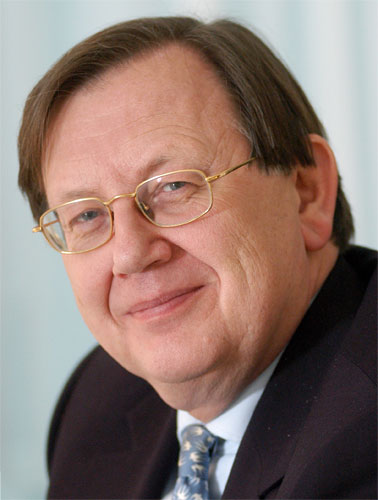 </center>
</center>

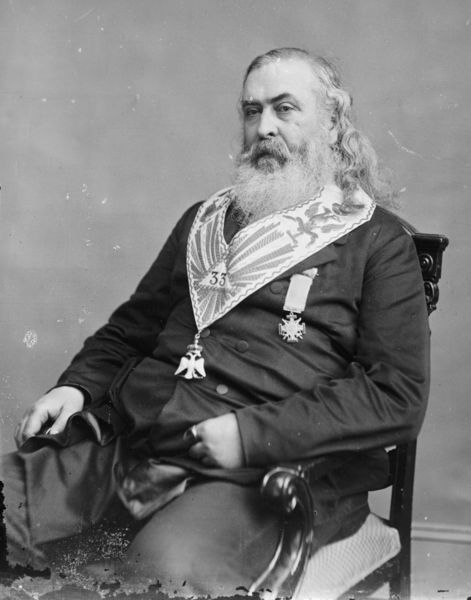
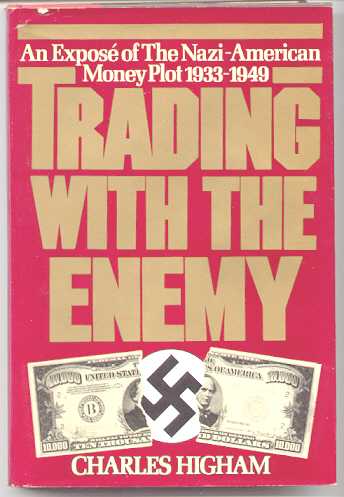

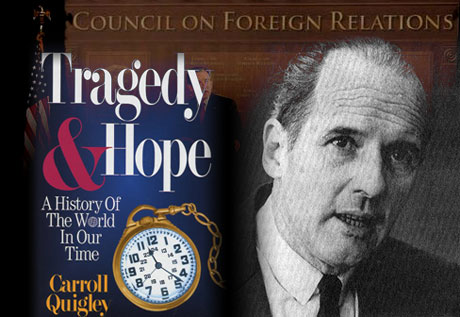

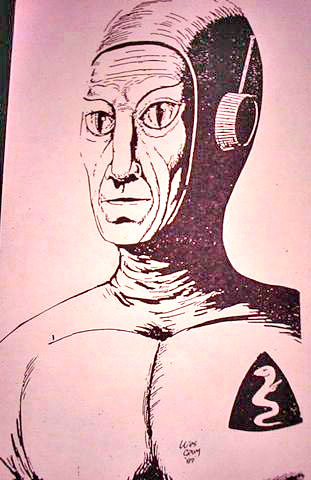
 </center>
</center>

